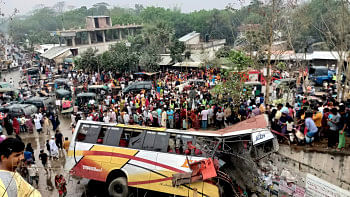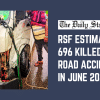Road safety, transport politics, and a curious policy U-turn

On August 6, 2018, the cabinet, under pressure from students waging a countrywide movement for road safety, green-lit a draft bill that would later be known as the Road Safety Act. Five years later, on August 3, 2023, the Road Transport and Highways Division (RTHD), under pressure from transport associations, green-lit the reversal of an order that would have prevented unfit vehicles from plying the streets, meaning that those vehicles can now legally put your life at risk, and there will be no stopping them.
Between the two approvals – and two instances of policy goalposts moving in diametrically opposite directions – lies a truth that we often talk about but whose gravity we seldom truly appreciate: the crippling effect of politics across the transport sector.
In Bangladesh, this sector, which represents various modes of transportation both private and public, has had profound implications for the country's economy, infrastructure development, and public welfare. Its significance can be understood from the fact that no other sector has as many ministries as it does: the Ministry of Road Transport and Bridges, the Ministry of Shipping, the Ministry of Railways, and the Ministry of Civil Aviation and Tourism. However, over the years, the intersection of political and business interests has frequently taken precedence over safety and sustainability. Its effect has been evident not just in policy formulation but also at the business end of it, such as issuance of permits, vehicle registration, licence renewal, fitness certification, training and recruitment, procurement, fare determination, construction, and allocation of contracts, often bypassing competitive bidding processes – the list goes on. Beyond their political clout that influences such decisions, transport associations are also well-organised, capable of mobilising their members to whatever end necessary.
You need a pesky probe report or court verdict to go away? They are your men. Need a road occupied for illegal truck parking? They have your back. Want to prevent BNP supporters from attending a district rally? They will cut off all communications through strikes. Want some undue legal concession? They can give teeth to your demands.
The gradual rolling back of legislation on road safety has happened right in front of our eyes. Long before the latest policy U-turn on unfit vehicles, several sections of the act were suspended for months after a strike by transport associations in late 2019. Following their demands, the RTHD then prepared a draft to amend the act, reducing fines under 11 sections as well as punishment under four sections. On multiple occasions, the authorities also waived the fines on vehicle owners who failed to update their documents on time. All this is proof of the undue concessions that transport associations and leaders continue to enjoy while the authorities turn a blind eye to the woeful state of our road safety situation.
Road transport is but one of the many frontiers where these influences and tactics, hard or soft, coalesce. But it's the one grabbing most of the eyeballs – for obvious reasons. Every year, without exception, this is where most of the tragedies occur. In 2022, according to the Passenger Welfare Association of Bangladesh, a total of 10,858 people were killed in accidents on all roads, railways and waterways combined. Of them, a staggering 9,951 died on roads alone. That's a 27.43 percent increase over the 2021 estimate, and the highest in eight years. Let that sink in.
What this goes to show is how the billions of dollars spent in building road and bridge networks and improving associated services across the country have had no effect at all on the safety of travellers, largely because of the interplay between politics and transport, or more specifically, patronage politics. In no other sector have terms like "regulatory capture" and "conflicts of interest" made more sense than in transport over the past decade or so. Even the road transport and bridges minister appeared to acknowledge it when, in 2018, he blamed politics and politicians for the problems plaguing the sector. It is against this backdrop that the Road Safety Movement that rattled this nexus seemed so promising, but also, with the power of hindsight now, so doomed to failure. Those students never really had a chance against the powerful political-industrial complex that has a vested interest in resisting reforms that might negatively impact their interests.
True, the Road Safety Act, 2018 – the fruit of that storied movement – is still here. But in effect and substance, it is as good as dead. The gradual rolling back of legislation on road safety has happened right in front of our eyes. Long before the latest policy U-turn on unfit vehicles, several sections of the act were suspended for months after a strike by transport associations in late 2019. Following their demands, the RTHD then prepared a draft to amend the act, reducing fines under 11 sections as well as punishment under four sections. On multiple occasions, the authorities also waived the fines on vehicle owners who failed to update their documents on time. All this is proof of the undue concessions that transport associations and leaders continue to enjoy while the authorities turn a blind eye to the woeful state of our road safety situation.
What I find curious about the August 3 U-turn is that it rolled back an order that, however short-lived, had seemingly come without any immediate external pressure. It is as if our policymakers had a momentary "lapse in judgement" or amnesia, if you will, before they remembered that they had certain interests to protect, and a status quo to help maintain. Equally curious is the defence given by the RTHD secretary who, when asked whether they were backtracking because of pressure from transport associations, said, "Can't we make a mistake and fix it?" The mistake he referred to – and which his division took over two months to notice – is the apparent lack of a clear definition of "goods-laden vehicles." And their idea of fixing it was to rescind the entire order. Speak of excuses.
The original directive was issued on May 17, setting a limit to the economic life of vehicles (20 years for buses, and 25 years for trucks and lorries). A draft guideline then published by the RTHD also said that no vehicle owner would be allowed to register a new vehicle if they owned one that had exceeded this operational limit. This was meant to ensure the roadworthiness of vehicles, as old and unfit vehicles are a major reason behind road crashes, and also to reduce pollution as black smoke emanating from them is a major polluter of the environment. Currently, there are over 74,000 registered buses, trucks, and other commercial vehicles (as of April) that are past their economic lifespan, as per the now-withdrawn limit. Just imagine the amount of damage that all these and other soon-to-be-expired vehicles, unhooked from any legal barrier, can do to us. Even one day without such restrictions is one day too many in our present context.
Who will be responsible for that? You know the answer.
Badiuzzaman Bay is assistant editor at The Daily Star.

 For all latest news, follow The Daily Star's Google News channel.
For all latest news, follow The Daily Star's Google News channel. 












Comments